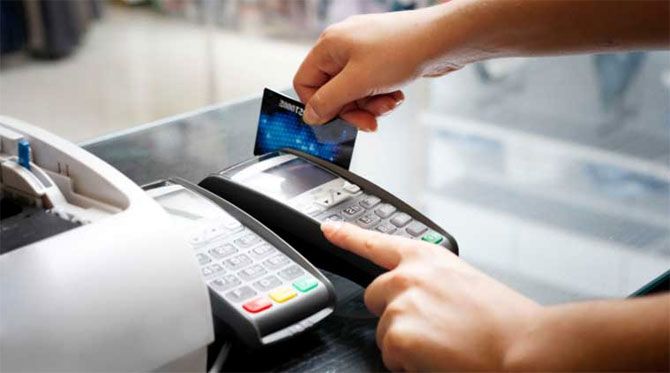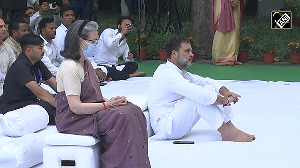The Watal panel had suggested an independent payments regulator be set up.

The acceptance of the final report of a government committee on electronic payments, headed by former finance secretary Ratan Watal, has run into difficulties with the Reserve Bank of India unwilling to cede its control over payment settlements to an independent regulator -- as the committee has recommended.
H R Khan, former deputy governor of the central bank, has made his dissent clear in a note as a member of the committee.
The differences mean it will be difficult for the finance ministry to push for the more significant changes in the payment systems to make digital cash more accessible for Indians.
Khan along with Chandan Sinha, executive director of the central bank, represented RBI's views in the committee.
According to Khan, the present regulatory architecture is fine. At best, there should be a monetary policy committee style format that will decide on goals but implementation should remain with RBI. The six-member committee should be headed by the RBI governor.
“The case for an independent regulator without considering the inherent advantages of the regulatory remit of the central bank, as is the case with most central banks globally, has not been made adequately.”
The stakes are high. Should RBI as a regulator also run the pipeline for e-payment transactions? Control over this pipeline could soon decide who is effectively the dominant financial regulator for India. RBI data show that by mid-December, the volume of transactions on this pipeline for a month is roughly the size of the Indian economy.
This is hand-shaking distance from the size of the Indian share market that includes the BSE and National Stock Exchange.
The key issues are as follows: When a payments service provider like Paytm or SBI Buddy offer a consumer to load her e-wallet with cash and authorise payment, they have to route the final settlement through a bank, before crediting the seller.
Only some of the payment service providers have direct access to banks including those which are run by banks. Most have indirect access as sub-members of a particular bank. The banks, of course, earn fees from the sub-members, which is loaded as cost on the final consumer.
The Watal Committee, minus Khan, wants this to end to “enable payments to be interoperable between bank and non-banks as well as within non-banks”. Not only that, the committee has suggested a two months time-frame for the government to make it happen. According to them, the current system makes payment companies dependent on the banking sector without any benefit.
Since payment companies (where Airtel and Vodafone are also entering soon) survive on how easy can they make payments and receipt of money for consumers, tying them to banks cuts the scope for innovation. This keeps the costs high, especially for poor consumers whose ticket size of transactions would be small.
RBI officials oppose this and cite the impact of demonetisation to buttress their views.
Khan and others argue the additional safety provided by banks at the back haul is necessary to keep the digital economy safe. The banking sector regulator has also argued that people don’t gravitate to e-money because there is no incentive for them to do so.
“Lack of incentives and disincentives and awareness and education play a role. How cost, convenience and confidence factors of digital payments vis-à-vis cash-based system can play important role has been brought out in the recent experience of demonetisation of HDNs (high-denomination notes),” one of them notes.
Making changes in law to set up a new regulator beyond the remit of RBI will not help. The government last week brought in a set of changes, including waiver of fees for booking of railway tickets, lower price for sale of petrol and diesel at government-run outlets, among others, to create the first set of incentives for people to use digital money.
“They do have a point,” says Shamika Ravi, fellow at Brookings India. In August this year, Brookings has brought out a Financial and Digital Inclusion Project Report for 26 countries. It spoke glowingly of the steps India has taken to push financial inclusion by using digital means. This report quotes a United States Agency for International Development survey on how Indians take to digital means to buttress the RBI position.
The study highlighted the “low levels of awareness and adoption of digital financial services. For example, only about 30 per cent of individuals who did not hold debit cards were aware of debit cards, and among those who did not use mobile money, only 20 per cent were aware of mobile money or e-wallets”.
Ravi says payments are a part of the basic role of a bank. “There will be incredible confusion envisaging a separate regulator who will be distinct from RBI to drive regulations for payments, while the lending and accepting of deposits will be under RBI.”
But, the Watal Committee recommendations are supported by more than one report including that of the Financial Sector Legislative Reforms Commission. The commission has clearly batted for a separate payments systems regulator, which the Watal Committee has endorsed.
“India has the lowest use of digital payments in the world as a consequence of a harmful policy framework. A payments revolution is required similar to the telecom revolution of the late 1990s,” Ajay Shah, professor, National Institute of Public Finance and Policy, notes in a Business Standard column.
RBI’s reluctance to make the banks move has made unstructured supplementary service data, or USSD -- the platform meant for the poorest, the one with hardly any business. This is in contrast with the business model of the telecom sector, where companies made voice telephony their cash cows before moving to data services.
The payments pipeline is dominated by real-time gross settlement systems (RTGS) meant for high-value transactions. National electronic funds transfer follows next and both are run by RBI. Others including mostly IMPS (immediate payment service) are run by NPCI. But, here, too, the settlement is made via RTGS, in three batches, every day.
The Watal Committee wants this entire pipeline to be taken over by NPCI. And, while it happens, access to RTGS and NEFT should be opened to all e-payment companies or payment service providers, who now have to route their business through banks.
The present system is biased as RBI adopts only those technologies that the banks it regulates can digest. As part of the drive towards independence, the company should be publicly listed like the stock exchanges with no single entity allowed to hold a majority of the shares. At present, only banks have shareholding in the company. Ravi also agrees this is necessary.
The Brookings paper, too, notes there is a need to simplify the payment architecture in India. “Mobile-enabled payments bank accounts are expected to be included in the UPI (unified payments interface), which should facilitate account interoperability,” it notes.
It describes the current digital system evolving in the country as, ‘India stack’. The four layers of the stack include a presence-less layer -- made possible by Aadhaar, a paperless layer -- where customers can generate their own identity digitally, a cashless layer, and finally the consent layer where the customers agree to part with their personal data with the vendors.
Photograph: PTI Photo.













